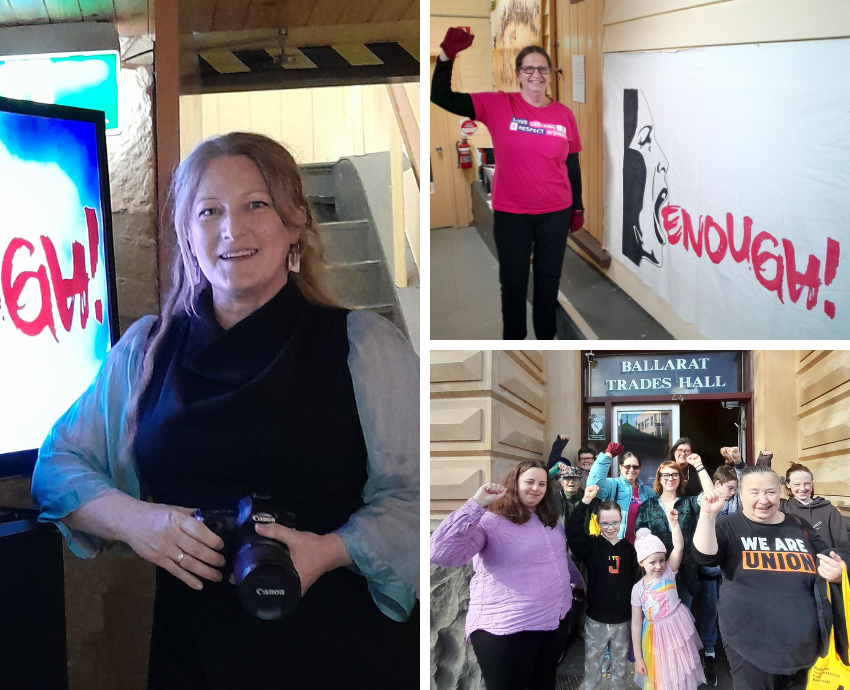
Justice | Enough!
Photographic exhibition by Rebecca Hosking
Part of the Ballarat International Foto Biennale
Ballarat Trades Hall
Open daily until October 22
“When she talks I hear revolution. When she walks I see revolution.”
“We don’t want to be ‘equal’ to men, we want liberation from the patriarchy.”
“The system isn’t broken, it was built this way.”
With these words, photographic artist Rebecca Hosking opened her exhibition Justice | Enough!, part of the Ballarat International Foto Biennale, at Ballarat Trades Hall, on August 26.
The exhibition, which runs until October 22, documents the “Women’s March for Justice: Enough is Enough!” protests that took place in Geelong and Torquay on Victoria’s Surf Coast, in March 2021. The protests were built in just 10 days with more than 4000 people taking part.
More than 200 March for Justice protests with more than 110,000 people participating took place across the country, on March 15.
Hosking said the exhibition marks that moment in time that gives visibility to “the power of women and allies to speak up, be heard, be visible, and activate positive change”.
Hosking spoke about “the words of the placard makers, the individual voices and collective knowledge base” in the Geelong event.
I was among a group of women from Geelong who travelled to the launch — held in the basement of the Trades Hall — which included members of the Geelong Women’s Unions Network, who organised the Geelong rally, and Socialist Alliance.
The founder of the March for Justice movement, Melbourne academic Janine Henry, tapped into a “collective rage” against sexual assault when she sent out an “angry tweet” asking women to support her in a protest at Victoria’s parliament house, back in 2021.
Happening at the time were the allegations of sexual assault abuse and misconduct in some of the highest offices in Australian politics and the lack of interest by the Scott Morrison Coalition government in pursuing those allegations.
One in five women (22% or 2.2 million) experienced sexual violence since the age of 15, according to a Personal Safety Survey released by the Australian Bureau of Statistics in March.
Socialist Alliance City of Geelong councillor Sarah Hathway, who spoke at the Geelong protest said: “Rape culture is how we end up with elected politicians, the highest offices in the country as well as employed staffers, being serial rapists, serial perpetrators of sexual harassment, serial groomers of underage girls, and being protected by others in high office ... allegedly.
“Rape culture keeps women ‘in their place’. It perpetuates inequality in society where the society doesn’t react to facts like ‘the fastest growing prison population is Aboriginal women’ and ‘the fastest growing homeless population is women over the age of 55’.”
As Pip Hinman reported in Green Left at the time, many March for Justice protesters were attending their first march, prompting some movement veterans to question whether much had changed since the 1970s.
While the second wave of the women’s liberation movement in the 1960s and 70s started from years of consciousness-raising meetings, Hinman wrote that the March for Justice movement was more immediate, demanding an end to gendered violence and for systemic change starting at the top.
Lucy Kenny, Associate campaigner at Amnesty International Australia told the ABC’s Annika Burgess in December, “I think we’re seeing a growth in the strength between women” referring to women cutting their hair is support of Iranian women and the “Woman, Life, Freedom” campaign. Kenny said it highlights the importance of “people power” with people standing up for the right to protest.
While the “Enough is Enough!” protests of 2021 may have been a moment in time, they showed that women and their allies will continue to fight to change a system that perpetuates misogyny and sexual violence.